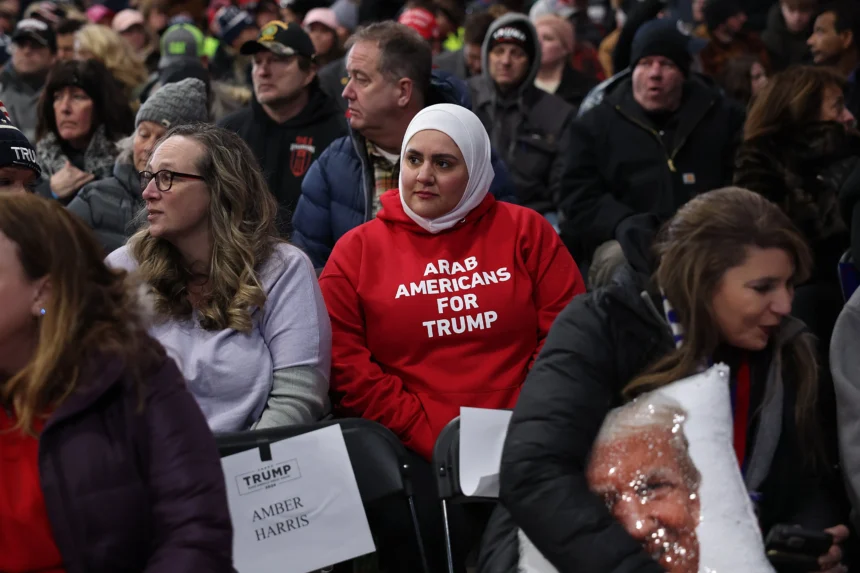President-elect Donald Trump has yet to take office, but some of his supporters in the Muslim community have already expressed regret, frustration, and concern over his pro-Israel cabinet selections.
Following Donald Trump’s return to the presidency in the recent U.S. election, considerable focus has centered on his unexpected backing from minority groups, notably Muslims and Arab Americans. However, his subsequent cabinet appointments, featuring individuals with strong pro-Israeli leanings, have generated significant unease among these same supporters.
Many Muslim American leaders who supported Trump did so out of frustration with President Biden’s approach to the Israel-Gaza conflict and his support for Israel’s military operations in Lebanon. However, the appointment of figures such as Marco Rubio, Mike Huckabee, and Elise Stefanik has created a sense of betrayal among these constituencies, according to Reuters.
“Our support was crucial to Trump’s victory, but his choices for secretary of state and other positions have left us deeply concerned,” stated Rabiul Chowdhury, a Philadelphia-based investor who established the “Muslims for Trump” organization and spearheaded the “Abandon Harris” initiative in Pennsylvania, Reuters reported.
Political analysts note that Muslim and Arab American voters, particularly in crucial swing states like Michigan, were instrumental in securing Trump’s victory. Many rallied behind him based on his campaign pledges and community outreach. His campaign consistently portrayed Trump as a peace-oriented candidate, highlighting his commitment to resolving Middle Eastern conflicts.
The nomination of Republican Senator Marco Rubio as Secretary of State has emerged as a major point of contention. Rubio’s steadfast support for Israel and his previous statements opposing a Gaza ceasefire have raised concerns. “These people are vicious animals,” Rubio remarked, in reference to Hamas.
Further intensifying the controversy, Trump has selected Mike Huckabee, Arkansas’s former governor and an outspoken supporter of Israeli settlements in the West Bank, as ambassador to Israel. Huckabee has consistently rejected the viability of a Palestinian two-state solution, describing it as “unworkable.”
Elise Stefanik, another staunch Israel supporter, has been nominated as U.S. ambassador to the United Nations. Her past criticism of the U.N., which she labeled a “cesspool of antisemitism” for condemning Palestinian casualties in Gaza, has added to the concerns.
These cabinet selections have triggered strong responses from Muslim community leaders. Rexhinaldo Nazarko, who leads the American Muslim Engagement and Empowerment Network (AMEEN), voiced significant concerns.
“Our disappointment runs deep,” he told Reuters. “The administration appears to be filled with neoconservatives and strongly pro-Israel, pro-war individuals, representing President Trump’s failure to honor his commitments to the pro-peace and anti-war movement.”
Nazarko added that while disappointed, the community remains committed to advocating for peace in Gaza, noting, “At least we’re now part of the conversation.”
Hassan Abdel Salam, a former professor at the University of Minnesota and co-founder of the “Abandon Harris” initiative, shared similar concerns. While he had anticipated some pro-Israel appointments, Salam expressed that the actual selections exceeded even those expectations.
“The administration seems to be pursuing an intensified Zionist agenda,” Salam observed. “Though we maintained our skepticism throughout… We’re still monitoring the administration’s direction, but it appears our community’s trust has been misplaced.”
Throughout his campaign, Trump made deliberate attempts to secure support from Muslim and Arab American voters. His campaign trail included visits to areas with significant Arab American populations, such as Dearborn, Michigan, and Pittsburgh, Pennsylvania, where he described Muslims for Trump as “an inspiring movement” dedicated to achieving peace and stability.
During his visit to Dearborn, a city with a predominantly Arab population, Trump expressed admiration for the community, stating, “I love Muslims.” These campaign stops appeared to successfully connect with voters, including Bill Bazzi, who serves as mayor of neighboring Dearborn Heights and endorsed Trump’s candidacy.
Bazzi, who had three personal encounters with Trump, maintains optimism that despite his cabinet selections, the president-elect will actively work to resolve the Gaza conflict. “I maintain my belief in his commitment to ending the war,” Bazzi shared with Reuters.
Rola Makki, who serves as vice chair for outreach within the Michigan Republican Party and identifies as a Lebanese American Muslim, expressed similar sentiments. “While not every Trump appointment will meet universal approval, what truly matters are the results,” she stated.
Makki also highlighted the conflict’s devastating impact, stating, “We must acknowledge the tragic toll: 50,000 Palestinian lives lost and 3,000 Lebanese casualties under the current administration.”
The Trump campaign strategically deployed key allies to strengthen support within Muslim and Arab American communities. Richard Grenell, who previously served as Trump’s acting director of national intelligence, played a crucial role in these outreach initiatives. Grenell, frequently introduced at campaign events as a potential Secretary of State candidate, was vital in portraying Trump as a peace-advocating leader.
Massad Boulos, father-in-law to Trump’s daughter Tiffany and of Lebanese descent, emerged as another significant figure. Through multiple engagements with Arab American and Muslim leaders, Boulos helped reinforce Trump’s image as a decisive leader capable of resolving Middle Eastern conflicts.
However, the recent cabinet appointments have raised significant doubts about Trump’s dedication to addressing these communities’ concerns.
As Trump’s Muslim and Arab American supporters wrestle with the implications of his cabinet selections, many remain committed to ensuring accountability. Community leaders including Nazarko and Chowdhury have pledged to maintain their advocacy for peace and continue amplifying their community’s political voice.
As Nazarko reflected, “While this outcome is deeply disappointing, we’ve at least succeeded in making our presence known.”
When contacted by Reuters for their perspective on these developments, Trump campaign officials did not provide an immediate response.
(This article is based on reporting by Reuters)







